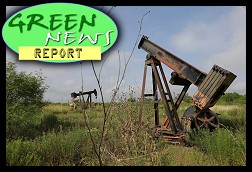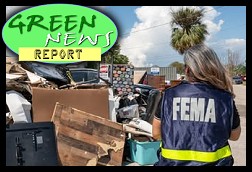 Well, today's BradCast, turned out to be a bit more exciting than planned. [Audio link to full show is posted below summary.]
Well, today's BradCast, turned out to be a bit more exciting than planned. [Audio link to full show is posted below summary.]
Just an hour or so before air time, Democratic Texas state lawmakers fled the state en masse to deprive state Republican lawmakers of a quorum during a special legislative session called to adopt a massive voter suppression bill. That, after last year's election was found to have been "smooth and secure", according to state officials. GOP-controlled committees in both the state House and Senate jammed through versions of the bill over the weekend, following overnight sessions in which hundreds of members of the public spoke against the measures.
Nonetheless, outnumbered in both chambers, more than 50 Democratic state Representatives left on chartered flights out of Austin on Monday to deprive Republicans of a legislative quorum. They reportedly headed for D.C. where they hope to press Senate Democrats to pass federal legislation to protect voting rights to help counter the Texas effort and other bills like it being adopted by Republican-controlled states across the country.
The rare move to leave the state --- where they can't be rounded up by Texas law enforcement and forced back to the Capitol --- comes after a Democratic walkout from the state Senate on the final day of the regular legislative session back in May. That walkout ran out the clock on the GOP voter-suppression bill at the time. Now, Dems would have to stay away for almost 30 days --- the length of the special session called by Republican Gov. Greg Abbott --- in order to block the legislative quorum needed to pass the measure in the Lone Star State's House of Representatives. The version of the bill Republicans now hope to pass would, among other things, ban the drive-thru and 24-hour voting sites that helped enfranchise tens of thousands of Houston voters last November, criminalize election officials mailing absentee ballot applications to voters and add new ID restrictions for mail-in voting, which is already incredibly difficult in Texas. All of the measures, according to voting rights experts, are both unnecessary would serve to disenfranchise marginalized voters, from minority groups to students to the elderly. We will, of course, be following this story closely in the days ahead.
Meanwhile, out West, blazing hot temperatures and extremely dry conditions amidst a years-long mega-draught have help sparked enormous fires in Washington, Oregon, Nevada, Arizona, Idaho, Colorado and California. The record fires, heat and drought are part of the cumulative effect of man-made climate change now devastating the nation and the planet. A massive fire in Oregon over the weekend disrupted service on three power transmission lines providing up to 5,500 megawatts of electricity to neighboring California. The power cuts, amid record heat, threaten a state already facing dire water shortages. Last week, Governor Gavin Newsom called for voluntary cutbacks in water usage of 15% by residents, agricultural operations and other businesses. Over the weekend, state power officials asked customers to cut back power usage.
With those multiple, very real emergencies now under way (including the rising threat of the Delta variant of the coronavirus in a state that has otherwise managed the pandemic very well under Newsom's leadership), the popular Democratic Governor now faces a GOP-funded recall election in just over two months time.
If Newsom were to be removed from office on September 14th, it would be only the second time in the state's 110-year history of the Gubernatorial Recall process. The last time was in 2003, when Republicans similarly ran a well-funded, professional misinformation and outrage campaign in order to oust a Governor. Newsom, elected to his first term in 2018, would otherwise face reelection next year anyway.
Late last week at The BRAD BLOG, our longtime legal analyst ERNEST A. CANNING highlighted the long, fascinating, ">progressive history of the state's Recall process, before arguing that it has gone awry in recent decades due to state Republicans' abuse of the process. He has outlined three suggested reforms that make a lot of sense, to help prevent much of the abuse of the process by Republicans in recent years. He argues that GOP policies in the state --- what's left of them --- have become so unpopular that the party is no longer seemingly able to win any state wide elections...unless they can engineer a low-turnout one, as they hope to see against Newsom in September.
"It's critical that everyone who is disgusted by this recall show up and vote," Canning argues. "The fact is, if Californians show up and vote, this recall will go down. But if you don't show up --- that's what the Republicans are banking on."
Among the reforms Canning is calling for after the upcoming Recall effort (which could cost state tax-payers as much as $400 million): Replacing a recalled Governor with the Lt. Governor (usually of the same party as the Governor), instead of holding a separate election for his or her replacement; Eliminating paid signature gathering by professional companies; and limiting the allowable reasons for Recalls of state officials. Canning joins us on today's program to explain and defend all of those suggestions, which he'd like to see put to voters on a statewide ballot referendum as part of the 2022 General Elections.
Finally, we take a few calls at the end of today's surprisingly busy show...
(Snail mail support to "Brad Friedman, 7095 Hollywood Blvd., #594 Los Angeles, CA 90028" always welcome too!)
|


 'Mob Boss' Trump's Global Trade Sanctions Tank U.S., World Markets: 'BradCast' 4/3/25
'Mob Boss' Trump's Global Trade Sanctions Tank U.S., World Markets: 'BradCast' 4/3/25 'Green News Report' 4/1/25
'Green News Report' 4/1/25
 Dems Step Up: Crawford Landslide in WI; Booker Makes History in U.S. Senate: 'BradCast' 4/2/25
Dems Step Up: Crawford Landslide in WI; Booker Makes History in U.S. Senate: 'BradCast' 4/2/25 Judge Dismisses Long-Running Challenge to GA's Unverifiable, Insecure E-Vote System: 'BradCast' 4/1/25
Judge Dismisses Long-Running Challenge to GA's Unverifiable, Insecure E-Vote System: 'BradCast' 4/1/25 'Green News Report' 4/1/25
'Green News Report' 4/1/25 Bad Court and Election News for Trump is Good News for America: 'BradCast' 3/31/25
Bad Court and Election News for Trump is Good News for America: 'BradCast' 3/31/25 Sunday 'Great Start!' Toons
Sunday 'Great Start!' Toons Vets Push Back at Trump, Musk Plan to Slash Health Care, 80K V.A. Jobs: 'BradCast' 3/27/25
Vets Push Back at Trump, Musk Plan to Slash Health Care, 80K V.A. Jobs: 'BradCast' 3/27/25 'Green News Report' 3/27/25
'Green News Report' 3/27/25 Signal Scandal Worsens for Trump, GOP; Big Dem Election Wins in PA: 'BradCast' 3/26
Signal Scandal Worsens for Trump, GOP; Big Dem Election Wins in PA: 'BradCast' 3/26 'Emptywheel' on Why Trump NatSec Team Should 'Resign in Disgrace' After Signal Chat Debacle: 'BradCast' 3/25/25
'Emptywheel' on Why Trump NatSec Team Should 'Resign in Disgrace' After Signal Chat Debacle: 'BradCast' 3/25/25 'Green News Report' 3/25/25
'Green News Report' 3/25/25 USPS 'Belongs to the People, Not the Billionaires': 'BradCast' 3/24/25
USPS 'Belongs to the People, Not the Billionaires': 'BradCast' 3/24/25 Sunday 'Suddenly Conceivable' Toons
Sunday 'Suddenly Conceivable' Toons 'Green News Report' 3/20/25
'Green News Report' 3/20/25 We're ALL Voice of America Now: 'BradCast' 3/20/25
We're ALL Voice of America Now: 'BradCast' 3/20/25 What Trump's 'Timber Production Expansion' Means (and Costs): 'BradCast' 3/19/25
What Trump's 'Timber Production Expansion' Means (and Costs): 'BradCast' 3/19/25 Courts Largely Holding Against Trump, Musk Lawlessness: 'BradCast' 3/18/25
Courts Largely Holding Against Trump, Musk Lawlessness: 'BradCast' 3/18/25 Chief VOA Reporter on Outlet Falling Silent First Time Since 1942: 'BradCast' 3/17/25
Chief VOA Reporter on Outlet Falling Silent First Time Since 1942: 'BradCast' 3/17/25 Trump EPA Unveils Plans to Endanger, Sicken Americans: 'BradCast' 3/13/25
Trump EPA Unveils Plans to Endanger, Sicken Americans: 'BradCast' 3/13/25 Trump Nixed Enforce-ment Against 100 Corp. Lawbreakers: 'BradCast' 3/12/25
Trump Nixed Enforce-ment Against 100 Corp. Lawbreakers: 'BradCast' 3/12/25 Bad Day for 'Strongmen': 'BradCast' 3/11
Bad Day for 'Strongmen': 'BradCast' 3/11 WI Election Could Flip Supreme Court Control, Musk Jumps In: 'BradCast' 3/10
WI Election Could Flip Supreme Court Control, Musk Jumps In: 'BradCast' 3/10
 VA GOP VOTER REG FRAUDSTER OFF HOOK
VA GOP VOTER REG FRAUDSTER OFF HOOK Criminal GOP Voter Registration Fraud Probe Expanding in VA
Criminal GOP Voter Registration Fraud Probe Expanding in VA DOJ PROBE SOUGHT AFTER VA ARREST
DOJ PROBE SOUGHT AFTER VA ARREST Arrest in VA: GOP Voter Reg Scandal Widens
Arrest in VA: GOP Voter Reg Scandal Widens ALL TOGETHER: ROVE, SPROUL, KOCHS, RNC
ALL TOGETHER: ROVE, SPROUL, KOCHS, RNC LATimes: RNC's 'Fired' Sproul Working for Repubs in 'as Many as 30 States'
LATimes: RNC's 'Fired' Sproul Working for Repubs in 'as Many as 30 States' 'Fired' Sproul Group 'Cloned', Still Working for Republicans in At Least 10 States
'Fired' Sproul Group 'Cloned', Still Working for Republicans in At Least 10 States FINALLY: FOX ON GOP REG FRAUD SCANDAL
FINALLY: FOX ON GOP REG FRAUD SCANDAL COLORADO FOLLOWS FLORIDA WITH GOP CRIMINAL INVESTIGATION
COLORADO FOLLOWS FLORIDA WITH GOP CRIMINAL INVESTIGATION CRIMINAL PROBE LAUNCHED INTO GOP VOTER REGISTRATION FRAUD SCANDAL IN FL
CRIMINAL PROBE LAUNCHED INTO GOP VOTER REGISTRATION FRAUD SCANDAL IN FL Brad Breaks PA Photo ID & GOP Registration Fraud Scandal News on Hartmann TV
Brad Breaks PA Photo ID & GOP Registration Fraud Scandal News on Hartmann TV  CAUGHT ON TAPE: COORDINATED NATIONWIDE GOP VOTER REG SCAM
CAUGHT ON TAPE: COORDINATED NATIONWIDE GOP VOTER REG SCAM CRIMINAL ELECTION FRAUD COMPLAINT FILED AGAINST GOP 'FRAUD' FIRM
CRIMINAL ELECTION FRAUD COMPLAINT FILED AGAINST GOP 'FRAUD' FIRM RICK SCOTT GETS ROLLED IN GOP REGISTRATION FRAUD SCANDAL
RICK SCOTT GETS ROLLED IN GOP REGISTRATION FRAUD SCANDAL VIDEO: Brad Breaks GOP Reg Fraud Scandal on Hartmann TV
VIDEO: Brad Breaks GOP Reg Fraud Scandal on Hartmann TV RNC FIRES NATIONAL VOTER REGISTRATION FIRM FOR FRAUD
RNC FIRES NATIONAL VOTER REGISTRATION FIRM FOR FRAUD EXCLUSIVE: Intvw w/ FL Official Who First Discovered GOP Reg Fraud
EXCLUSIVE: Intvw w/ FL Official Who First Discovered GOP Reg Fraud GOP REGISTRATION FRAUD FOUND IN FL
GOP REGISTRATION FRAUD FOUND IN FL


































